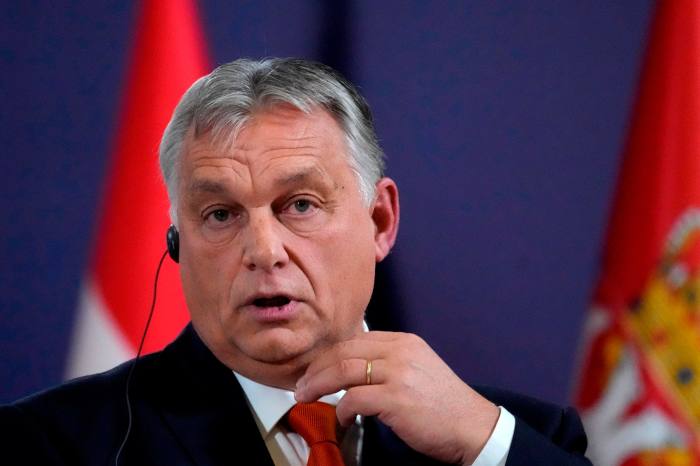[ad_1]
Hungary has removed its cap on petrol and diesel prices after supply shortages caused panic buying and threatened the country’s ability to replenish emergency stocks, the government said.
The price caps, introduced by Prime Minister Viktor Orbán 13 months ago as fuel prices climbed across Europe, became untenable after costs to import refined products soared on the back of EU sanctions on Russian oil.
The caps, which set pump prices at about €1.20 a litre — the lowest level in the EU — prevented importers from making a profit. The loss of imports and technical difficulties that halved domestic production at national oil company MOL’s refinery near Budapest have left Hungary with about a third of its normal supplies in recent weeks.
The decision to scrap the fuel price cap shows how a deteriorating economic outlook is putting pressure on Orbán’s populist economic policies.
“I had to find a remote village with a small station . . . people were panicked,” said Gabor, a driver of a plug-in hybrid vehicle who had returned to Budapest after a trip to eastern Hungary. “I was already calculating routes home using only electric charging stations. This has been crazy.”
Gergely Gulyás, Orbán’s chief of staff, said EU sanctions on Russia after its full-scale invasion of Ukraine — including the latest oil price cap — had disrupted the market, even though Budapest has an exemption to import Russian crude through the Druzhba pipeline.
“MOL told us it can no longer supply the country without imports,” Gulyás said as the government announced the scrapping of its fuel cap late on Tuesday. “So the government heeded its advice and two days after the sanctions kicked in it scrapped the fuel price ceiling.”

Budapest will replace the fuel price cap with a windfall tax on oil companies. “From now on, sanction-affected petrol prices are in effect throughout Europe,” Orbán said in a Facebook post on Wednesday. “In Hungary, the resulting extra profit [will be] deducted and directed to the [budget].”
Hungary blamed “Brussels sanctions” on Russia for its economic difficulties. Disputes over rule-of-law reforms have led the EU to withhold a combined €13.3bn in post-pandemic recovery funds and cohesion payments.
Market participants have warned that importers, including MOL, will not resume purchases unless they can sell at a profit.
MOL chief executive Zsolt Hernádi compared the fuel crisis to the oil shortages of the 1970s, saying the artificially low prices caused people to stockpile and use fuel recklessly, leading to a 45 per cent rise in fuel demand from last year.
“The situation became critical,” Hernádi said. “Panic started. MOL could no longer cope.”
Removing the price caps to allow a resumption of imports was important now, Hernádi said, as Hungary and other EU countries prepare for a ban on the import of Russian refined petroleum products to begin in February. MOL feeds Russian crude to its refineries in Budapest and Bratislava, Slovakia.
MOL is retooling its Bratislava facility to allow it to use lighter Brent-type crudes as feedstock, enabling it to increase exports of non-Russian refined products to Hungary, analysts noted.
“Europe as a whole is about 10 per cent short on diesel, which will lead to supply disruptions next year,” said Erste Bank oil analyst Tamás Pletser. “Hungary is 30 per cent short but Bratislava can supply it easily.”
Oil supply from the Druzhba pipeline has been reduced following Russian attacks on Ukraine’s power grid. “We need to have alternatives . . . restart [fuel] imports and replenish emergency stocks so we can supply the market in case of a disruption,” Hernádi said.
The government would remove similar price caps for products including basic foods and financial services if they led to shortages, Gulyás said. György Matolcsy, the central bank’s governor, told MPs this week that the caps were a mistake, forcing businesses to recoup losses by raising prices on non-capped products and pushing inflation up by 3-4 percentage points.
With Hungary facing inflation of 15-18 per cent next year, Matolcsy said: “All price caps must be phased out immediately . . . We must not return to socialism, which proved that price caps don’t work.”
The resumption of normal supply will probably take several months, according to Hungary’s association of independent fuel station owners, which recorded disruptions in more than 150 towns and cities.
“If you once exported fuel to Hungary, you need some convincing to route it back again,” said László Gépész, vice-chair of the association. “Trust needs to be rebuilt, and premiums will apply.”
He added that the price caps had taken away “the flexibility of the system that came from imports and the strategic reserves . . . we must forget this price cap regime, and quickly”.
[ad_2]
Source link